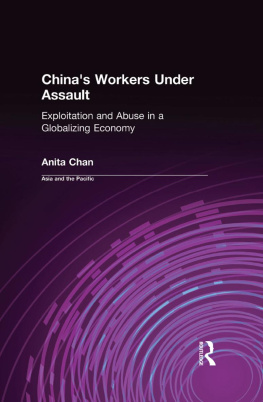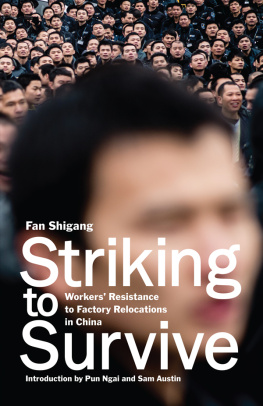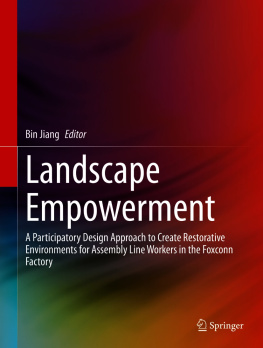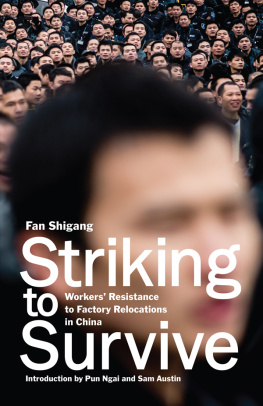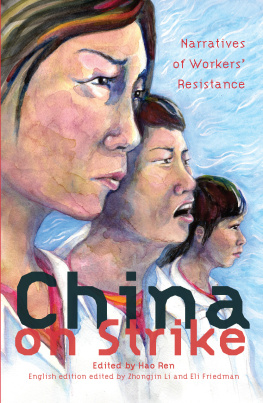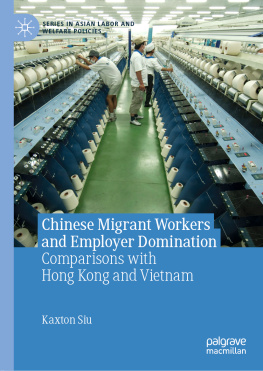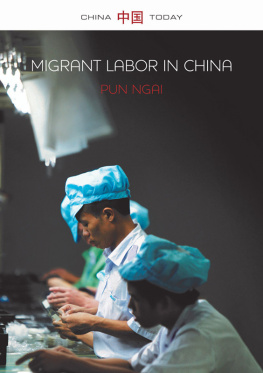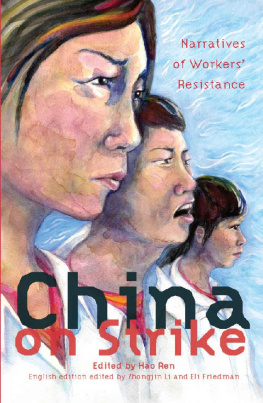Advance Praise for Disenfranchised
In Disenfranchised , Joel Andreas provides the most thorough account available of workplace politics in Mao-era China, as well as an assessment of the impact of market reforms. Conceptually concise and empirically rich, this study pushes us to rethink the relationship between democracy and the market in the process of post-socialist transformation. This is both a wonderful labor history as well as theoretically engaged political sociologyhighly recommended!
Eli Friedman , Associate Professor of International and Comparative Labor, Cornell University, author of Insurgency Trap: Labor Politics in Postsocialist China
Disenfranchised charts the rise and fall of the most sustained experiment in industrial citizenship anywhere. Andreas documents how serious a commitment this was for the party/state, how it resonated with workers, the ways it developed over the Maoist period, and how structural reform managedoften against considerable worker oppositionto dismantle it. This book will redefine our understanding of factory politics in Maoist China and throw what has followed into the starkest relief.
Marc Blecher , James Monroe Professor of Politics and East Asian Studies, Oberlin College, coauthor of Tethered Deer: Government and Economy in a Chinese County
Questioning the one-dimensional conventional wisdom concerning the evolution of Chinese industrial relations, this marvelously researched and analytically sophisticated book provides a nuanced and richly textured account of the vicissitudes of grassroots industrial citizenship in China from the late 1940s to the present. A must read for scholars interested in the history, legacy, and prospect of Chinas socialist experiments in its tumultuous twentieth century.
Yiching Wu , Associate Professor of East Asian Studies, University of Toronto, author of The Cultural Revolution at the Margins: Chinese Socialism in Crisis
In a highly original account, Andreas shows that under Maoism Chinese workers developed the capacity to control and discipline their supervisors, but their lack of autonomy ultimately undermined communisms professed goals. Taking advantage of the regimes restrictions of bottom-up initiatives, first bureaucrats and then capitalists obliterated workers inclusion. Through exploring this exceptional case, Andreas raises generaland troublingquestions for all readers and activists who believe in participatory democracy.
Cihan Tual , Associate Professor of Sociology, University of California, Berkeley, author of The Fall of the Turkish Model
Disenfranchised
The Rise and Fall of Industrial Citizenship in China
JOEL ANDREAS
Oxford University Press is a department of the University of Oxford. It furthers the Universitys objective of excellence in research, scholarship, and education by publishing worldwide. Oxford is a registered trade mark of Oxford University Press in the UK and certain other countries.
Published in the United States of America by Oxford University Press
198 Madison Avenue, New York, NY 10016, United States of America.
Oxford University Press 2019
All rights reserved. No part of this publication may be reproduced, stored in a retrieval system, or transmitted, in any form or by any means, without the prior permission in writing of Oxford University Press, or as expressly permitted by law, by license, or under terms agreed with the appropriate reproduction rights organization. Inquiries concerning reproduction outside the scope of the above should be sent to the Rights Department, Oxford University Press, at the address above.
You must not circulate this work in any other form and you must impose this same condition on any acquirer.
CIP data is on file at the Library of Congress
ISBN 9780190052614 (pbk.)
ISBN 9780190052607 (hbk.)
ISBN 9780190052638 (epub.)
Contents
This book was inspired by the same fundamental question that led me to write my first book: why did the twentieth-century Communist project to eliminate class distinctions fail? The most uncomplicated answerand one that is assumed without much inquiry by many scholarsis that Communist leaders were never serious about the egalitarian goals they espoused. I contested this answer in the first book, Rise of the Red Engineers: The Cultural Revolution and the Origins of Chinas New Class , which recounted the protracted series of harsh class-leveling campaigns carried out by the Chinese Communist Party (CCP) in the decades after it seized power in 1949. The book provided an answer to the question but not one that was definitive. Even if it did not fully explain why the CCPs class-leveling project failed, however, it did help me pose the question more sharply. To understand the agenda of the present book, therefore, it is necessary to briefly summarize the arguments I elaborated in Red Engineers .
Class-leveling campaigns in China targeted three types of capitaleconomic, cultural, and political. The express goal was to democratize power, that is, to radically redistribute capital so that it was dispersed more equally through the population. The focus shifted sequentially from economic to cultural and finally to political capital. In all three fields, I argued, leveling campaigns were ruthless and violent; the results, however, differed considerably.
In the early years of Communist power, the main target was economic capital, that is, private property in means of production. In rural China, land was redistributed and then collectivized, while in urban China, all private enterprise was nationalized or collectivized. The propertied classes were completely, often violently, dispossessed, and economic capital, which had been the most important mechanism of class differentiation, was completely eliminated. All productive property was placed in the hands of public entities, and class differences within these entities, which remained substantial, were subsequently based largely on cultural and political capital.
After economic capital was eliminated, the focus of leveling shifted to cultural capital, that is, the educational and cultural resources that served as means of class differentiation. Under the banner of eliminating the distinction between mental and manual labor, Communist leaders relentlessly undermined the status of the old educated elites, attacking the cultural traditions that underpinned their status, compelling those who worked in offices to engage in manual labor, and systematically redistributing access to education. During the Cultural Revolution decade, the most radical phase of cultural redistribution, schools were built in virtually every village and the overarching goal was to have every child study for 9 or 10 years and then go to work. Higher education was reduced to short-term technical training programs, universities built factories and factories built universities, and admission was governed by a workerpeasantsoldier recommendation system, which discriminated against children of the old educated elites (and, in practice, often favored children of the new political elites). Although these radical policies did not come close to eliminating class differences based on education and the harm they caused was substantial, the program was coherent and effective and, during the years it was in place, substantially reduced inequality in the cultural field.


